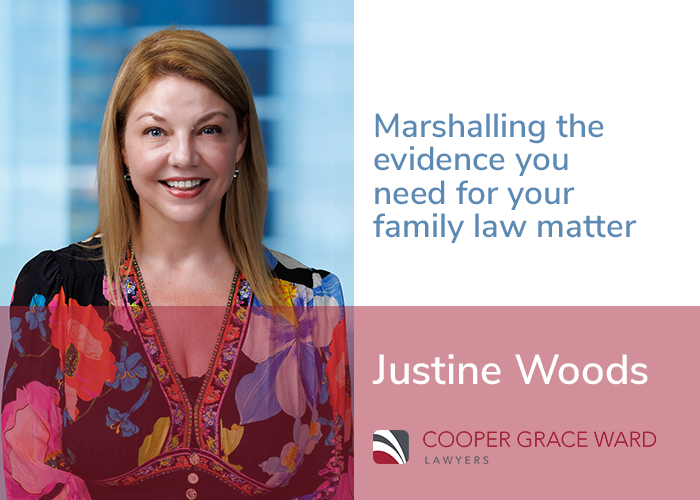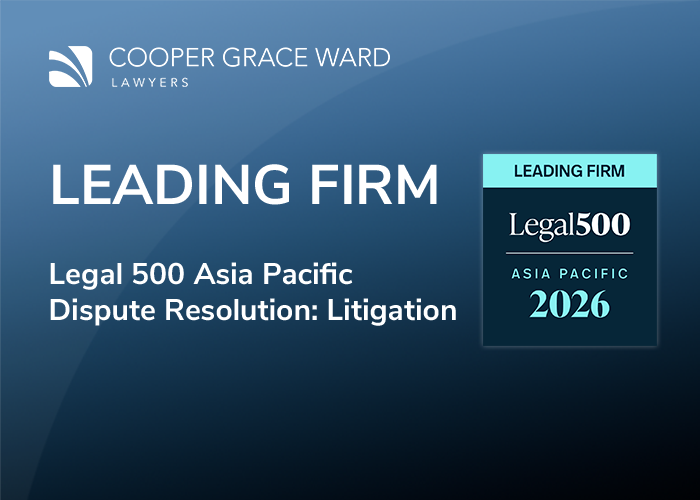In this week’s video, family law partner Justine Woods discusses the evidence that you might need to marshal for your family law matter.
Video transcript
Hello, hello, everyone. I’m Justine Woods, I’m the family law partner at Cooper Grace Ward. And today, I thought I’d discuss the evidence that you might need to marshal for your family law matter. Now, when I first started practicing in 1995, we went to mediation. But it was not mandated. It wasn’t a compulsory part of the process. Sometimes we didn’t even prepare mediation position statements. It was about just a direct negotiation, often with the parties in the room crying, shouting, behaving well or badly, depending on their temperament, but really just trying to get a deal in a fairly unsophisticated way 30 years ago. Now, it’s required under the pre action procedures of the Federal Circuit and Family Court of Australia, both Divisions 1 and 2 before, unless there are exceptional circumstances, you can go to court. And so, the emphasis on preparing for that mediation is quite intense. And the evidence that we might have saved for a trial before a judge or an interim hearing before a judge, often now really needs to be brought forward to a mediation. And that’s reflected in a number of interim types of decisions that have recently been made by the court. And it’s across both parenting and financial matters.
Rana and Macaulay No.2
So, if I give you the first example is a case of Rana and Macaulay No 2. Again, a very bad sign to have No 2, sometimes No 4, even I’ve seen in cases that means these parties cannot stop litigating. But here, both parties were from overseas countries, but they had lived and made their life and had a child here in Australia. The father wanted to remain here in Sydney in Australia, and the wife wanted to return to her country of origin, which is not specified in the judgment. So, as well as now anonymising all of the names, it’s now customary to give up like X or Y for names of countries. So, we don’t know which country she hoped to return to. But one of the issues and the evidentiary issue I was interested in, in that case, was that the wife had been seeing a psychiatrist for some time and had mental health issues, and her own doctor formed the view that if she were permitted to return to her original country and be with her family, that her symptoms would abate and she would recover, and that she ought to be able to take the child with her. The court appointed a single independent expert, who met with the mother and formed a different view, and said that actually, she was likely to make a very good recovery from her anxiety and depression wherever she lived, and that it wouldn’t necessarily be relieved by returning to her country of origin. And then that, of course, fed into the judge’s decision. So, the mother was absolutely opposed to the independent expert having been appointed in the first place and then in cross examination, rejected his evidence and said he’s wrong. The judge very much relied upon the evidence of the independent expert, had nothing critical to say of the mother’s own doctor, but said the independent expert had the benefit of impartiality and was appropriately qualified and instructed to give the opinion that he did, which was that the mother’s anxiety and depression hadn’t actually affected her parenting. They were both perfectly good parents, but he thought that her condition would stabilise and improve wherever she was.
Your right to freedom of movement
Now, then in the relocation piece, it’s very important and people are often upset when I have to advise them. Your right to freedom of movement, the adult considerations, all the excellent reasons you might have to relocate away from the parent of the child, the other parent of the child. That is not the court’s first job to assess those things. The very first and prime consideration is what is in the child’s best interests. The Judge must decide what the care arrangements for the child or children should be based on an assessment of the children’s best interests, and only then are the other factors such as should I have my right to relocate right constrained by the court. Only then will that come in, but it sits under the primary assessment. And in this case, based on a number of other factors, including not an unkind assessment, but an assessment that said, perhaps the mother hadn’t really thought out what it would be like to relocate with the child to her country of origin. And in cross examination, she also admitted that she would move regardless. And so the judge found that even though otherwise the care arrangements would not have been disturbed by order, that if the mother insisted on relocating, then the child would come to live with the father and remain in Australia. So, the evidence there, whether you like it or not, whether you’re that thrilled to have it done, expect there to be independent evidence about children’s matters and participate in that process. On a financial matter, you have to really give consideration. And I talked about this in all videos, I know, but what is it that I need to prove to the court to get the outcome that I’ve been advised is realistic and just an equitable on the facts and on the application of the law to those facts?
Case of Sloan and Brendan
So, a case of Sloan and Brendan, in that case, de facto relationship. The wife had a number of very serious neurological and other conditions. She had her own neurologists report about the treatment, diagnosis, prognosis and a discussion of what her symptoms might be and what the potential was for deterioration in those symptoms over time. She also wanted, and in certain circumstances, you need the special leave of the court to have additional evidence. The wife wanted the parties to appoint a single expert, to give a report on what affect her neurological and other conditions would have on her ability to join the workforce. The male de facto opposed that and they’re quite reasonable reasons effectively. It takes more time. It’s additional costs to which we both have to contribute. It will delay the process overall. And what happens is if you can’t reach an agreement, of course you ultimately, years later, may I say, end up before judge who has to make a decision based on the evidence at the time. So, every additional witness you’ve got, including expert witnesses, prolongs the length of your trial and this is really just anecdotal, but the longer the trial, the further away your trial is going to be, because it’s harder for our very busy judges to find big blocks of time. So, it wasn’t an outrageous position for him to take. But he said, no, I don’t want another report. I’m quite happy with the neurologist, but the judge in this case found that it is a different set of considerations. So, the mother’s doctor had given a perfectly appropriate report about her medical conditions, but an occupational physician was the more appropriate expert to produce a report on on a different issue, which was the ability to return to work and the effect that her conditions would have on her ability, whether she could at all return to the workforce. And she’d been out for some time, or in what capacity she could work. Because all of that and both sides conceded that if they couldn’t reach an agreement, the judge would have to say, what are each person’s future needs? And that’s ability to work, income, state of health, care children, etc.. So, the judge there said, no, I entirely agree that there ought to be an occupational physician appointed and one was appointed. So, there are lots of other examples that I can give you, some just from ordinary practice. So, if you’re talking about, I want to relocate and it doesn’t have to be terribly far, but enough that it might disturb the children’s schooling or sometimes as petty as everyone will have to do more driving. You have to have some evidence, for example, about how long it actually takes. If you’re talking about the ability to get a job or what you might earn if you move somewhere else, you have to have, for example, a HR report about what your prospects might be, what you could earn in a different position or role or suburb. Your own version of events will not be accepted by the court as evidence. There are some cases that have gone to trial about things like that, and it’s obvious from the judgments that the absence of evidence profoundly affected the outcome.
Queensland same sex case
So, there’s a long same sex case here in Queensland where one lady was a teacher in the public system, was able to be open about being gay. The other lady worked in a private school, could not where it would have been unacceptable, and said in her own material that meant that I could never really, I couldn’t be promoted. I couldn’t take certain postings, but had no evidence, no expert evidence about that. No adjustment was made in favour of that person who had earned less, who had then followed the other spouse around, in terms of their job. So, you need corroborative evidence about things like that. Now, if sometimes, given our aging population, we’re having matters where and the prospect of death is used on both sides and both parties to advance their argument. So, I’ve had matters where we’re having to say and it’s, it’s very unseemly. But you well, you’re this age, so, you’re not likely to live very long. We don’t just get to say that. We all say, I’ve looked up the census and the average, the average age of an Australian lady’s death is . That’s not evidence. You have to have some actuarial calculations about that. So, in not every case do you require evidence of this nature. But if there’s something unusual and it’s a real plank of your case, there will have to be expert reports. And really, I think, to improve and enhance your chances of success, earlier rather than later. If you’d like to talk about that or any other issue bearing on your family law matter, you’re most welcome to contact us at. Cooper Grace Ward.





